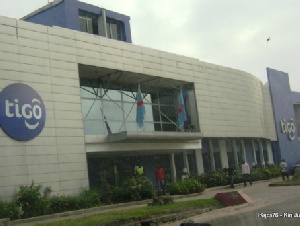Tigo, operated by Millicom Ghana Ltd. and a pacesetter in product innovation, has rolled out an upgraded internet security system aimed to ensuring that the cyber security of its numerous customers is guaranteed.
The system which virtually eliminates spam activities in customers’ emails also reduces incidents of phishing such as password, credit card details thefts and unsolicited emails. Most often, communications purporting to be coming from popular social web sites, auction sites, banks, online payment processors or IT administrators are used to lure unsuspecting internet users who fall prey to the activities of cyber criminals. Phishing emails may also contain links to websites that are infected with virus or malware which could corrupt or erase data from user’s computers.
The decision to roll out such internet security system by Tigo follows the rising incidence of cyber crime activities in Ghana which has earned the country the infamous number two spot on the league of countries with high incidence of cyber theft in the world after neighbouring Nigeria.
Though the Communications Minister, Dr Omane Boamah recently disputed the claim of Ghana being the second country in the world with the highest level of cyber crime, the real issue is not where the country lies but whether there is the existence of a high level of cyber crime in the country, which unfortunately cannot be indisputable.
News abound in the country of young men, especially, making huge amount of purchases online with stolen credit card details of unsuspecting people who might not even be residing in Ghana. In an age when internet security has become one of the biggest worries of even the developed world, the network giant’s move is one in the right direction.
Tigo in a bid to demonstrate its care for the safety of its clients has gone an extra mile to put in place this anti-spam security system which effectively cleans up all outgoing and incoming mails or harmful mails of Tigo Internet service users through Tigo’s network. Thus all harmful emails with the potential to phish or damage client’s IT systems are filtered by Tigo.
Commenting on Tigo’s decision to take on the burden of ensuring its customers internet security, Gloria Adutwumwaa Frempong, Internet Offer Design Manager at Tigo says the move is to “ensure that customers who use Tigo's internet services for either social or business purposes can do so without having to worry about the security of their data."She added that this upgrade comes at no extra cost to consumers and will enhance Skyping experience on the network.
Meanwhile, Tigo has taken another initiative aimed at offering the best internet services to its customers. The network giant has rolled onto the Ghana Internet Exchange, a facility which keeps Ghanaian internet traffic in Ghana.
This facility also allows local Internet Service Providers (ISPs) and Network Operators to easily exchange traffic within Ghana, while improving connectivity and services for their customers. With this connection, Tigo Internet users stand to gain immensely. First, because of Tigo’s decision to connect to the Exchange, users of Tigo Internet will no longer have to pay international bandwidth costs for emails sent to local contacts.
The prevailing situation currently is that emails sent by Ghanaians to their local contacts attract international charges, a development which makes internet usage quite expensive in Ghana. Connecting to the exchange will effectively take away these international charges making internet usage cheaper and affordable.
Another notable benefit that will accrue to Tigo Internet users from this association is the fact that transit time for internet traffic will greatly be improved. This increased speed and reliability means that Tigo Internet users can enjoy additional “value-added” services such as web content hosting, audio and video streaming, E-commerce, etc services which hitherto have had to be sourced from international providers.
Business News of Wednesday, 19 March 2014
Source: Eric Kwame Amesimeku

















